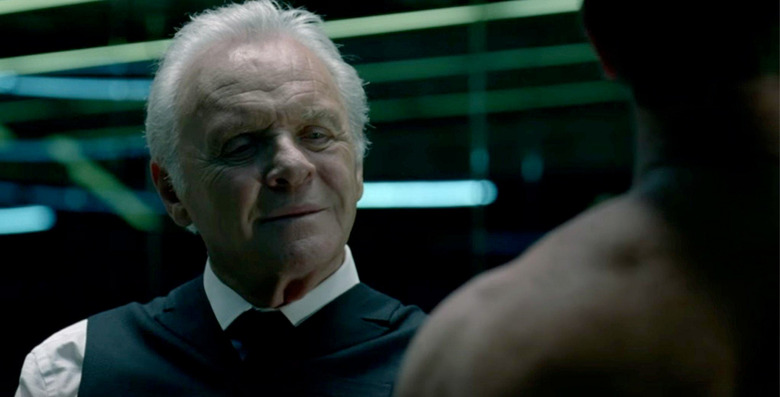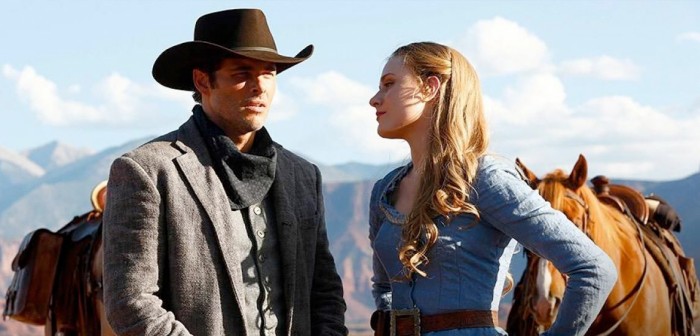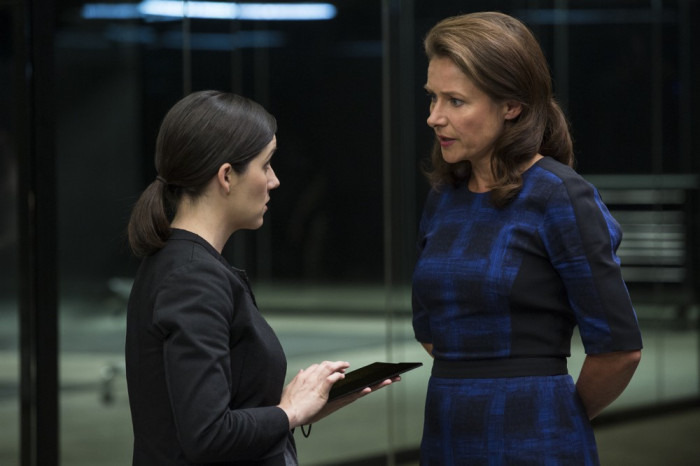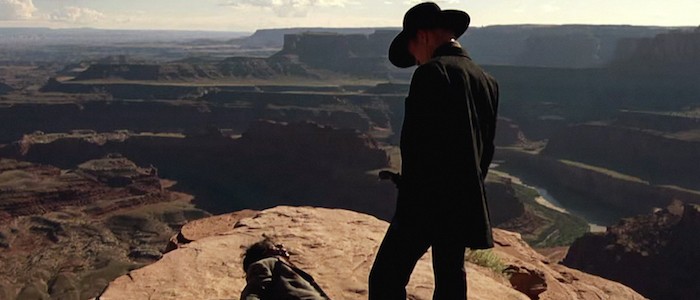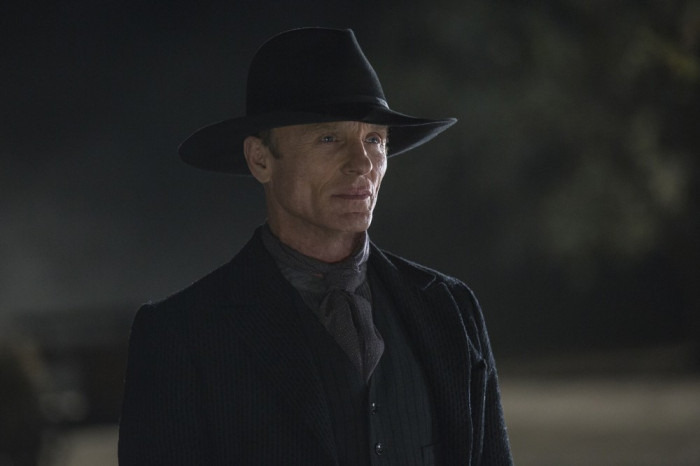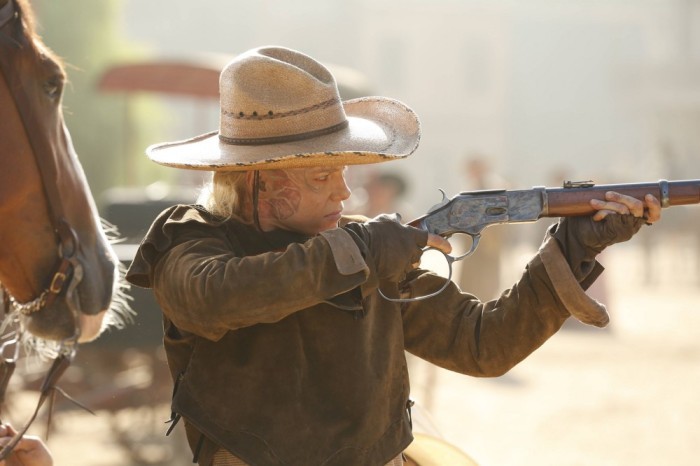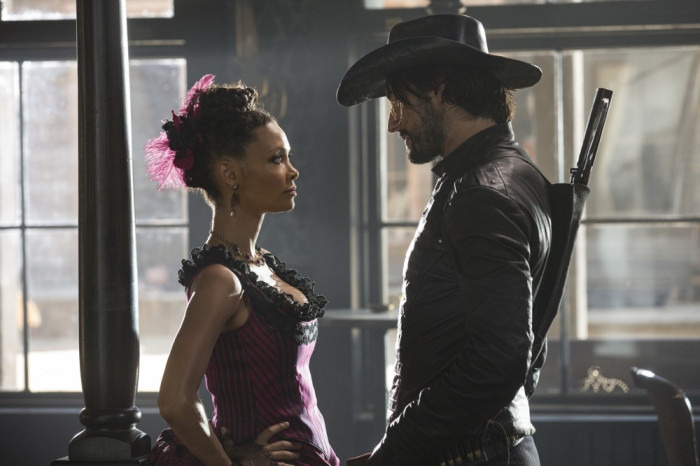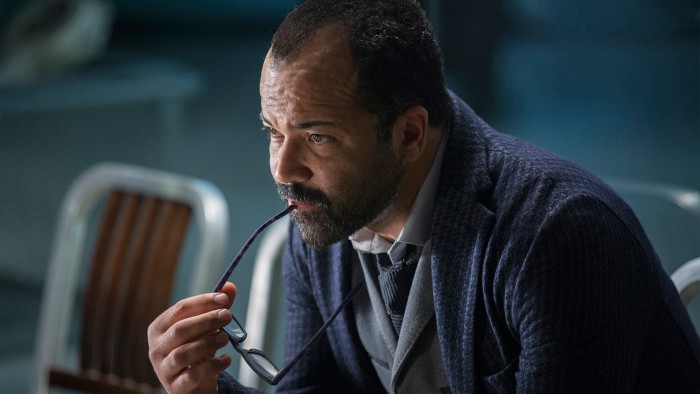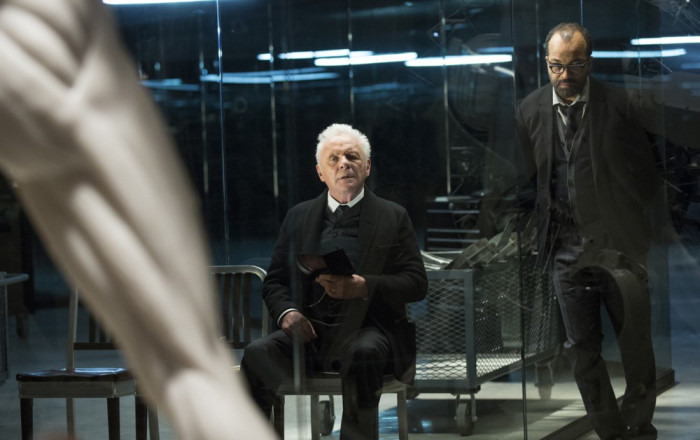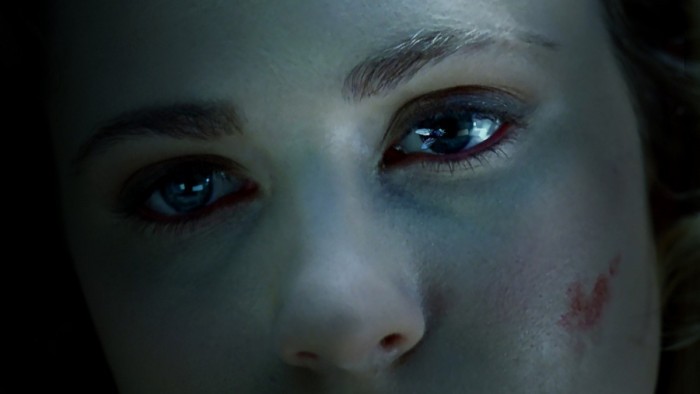'Westworld' Spoiler Review: 10 Questions From "The Original"
HBO's Westworld officially premiered last night and it was one hell of a first episode. Jonathan Nolan and Lisa Joy's series take the premise of Michael Crichton's 1973 film and sprint with it, carrying this tale of robot cowboys, debauched tourists, and theme park ops into bold new territory. It's a smart science fiction powered by western imagery and lightly coated with horror. It's weird. It's dense. It's one of the more promising pilots I've seen in some time.
If you haven't seen the series premiere, titled "The Original," our own Jack Giroux has got you covered with his spoiler-free thoughts. But it's Monday, so it's time for a deeper conversation. Each week, we're going to ask ten spoiler-filled questions about the latest episode of Westworld. Some of these questions will be rhetorical and some literal. Others will have definitive answers and some will not. Let's dive right in.
How Does This Park Actually Operate?
My favorite moments in Jurassic Park and Jurassic World don't involve dinosaurs running amok and devouring the ambitious/foolish humans. I've always been far more interested in how such a theme park built around cutting edge science fiction technology would actually function on a day-to-day basis. I like watching park operations at work and I enjoy the casual conversations about corralling and maintaining the impossible. Maybe that would make me part of the problem if these places were real – I would be first in line to visit both Jurassic Park and Westworld.
While the first episode of Westworld does lay the groundwork for when things go completely and horribly wrong for everyone involved, I was on the edge of my seat just watching how this place works. "The Original" slowly releases more information about the park with every scene, offering looks at everything from the design and programming department to how park security functions. Other details lit a fire under my imagination, like guests discussing their multiple visits and deciding whether they wanted to enjoy a wholesome family adventure or go "black hat."
Of course, there remain large holes in how Westworld functions. We know that the robots operating within the park act out the same narrative loop over and over again, but it is never specified how long each loop really is. After all, we see Evan Rachel Wood's Dolores Abernathy wake up and follow her routine several times but we also see the park's head writer, Lee Sizemore (Simon Quarterman) adjust a storyline by moving events up a whole week, suggesting that each loop may be longer than initially suggested. The fact that I'm already so interested in how Westworld operates is a good sign – I want to explore every nook and cranny of this place.
Who Are These Robots, Anyway?
Unlike the 1973 original, the new Westworld chooses to introduce us to this world from the perspective of the robots populating the park and the results are horrifying. These aren't the murderous audio-animatronics Michael Crichton originally envisioned. They're artificial creations who are baby steps from self-awareness, programmed to overlook inconsistencies in their world and suffer all kinds of abuse from paying guests. While the movie was a tale of technology running amok, the show is already setting itself up to be a very different animal: a story of slaves revolting against their masters.
So far, the cast of characters on this front of the storyline is promising. Evan Rachel Wood is the closest thing the show's entire ensemble has to a proper lead, as the episode uses her to introduce us to the basic concepts behind Westworld. Her performance is strong stuff, asking her to play the naive western gal and the machine who can be manipulated and reprogrammed behind the scenes. James Marsden also turns in strong work as Teddy Flood, her scripted love interest.
While those two stand in the spotlight, they're surrounded by an impressive ensemble, including Rodrigo Santoro as a flashy and murderous gunslinger and Thandie Newton as the madam of the local brothel. As in Game of Thrones and Deadwood, each scene is so full of minor characters that it is hard to pinpoint who could ultimately step forward and who is there simply to provide some background color. I do hope that we get to see more of Michael Wincott's Old Bill, the defective and outdated robot currently "living" out the rest of his existence in cold storage. In an hour full of people eerily bringing life to artificial beings, his stop-start physicality (aided by killer sound editing) is nothing short of fascinating.
...And Who Are Their Human Overlords?
"The Original" also offers equal screen time to the folks running the park and the truth is that most of them are still enigmatic at best. Westworld is a show so full of weird details that it falls on these people to provide all of the necessary exposition and get us situated. In the first hour, the people ensuring that the park gets by day-to-day aren't quite characters as much as they are grounders – they tell us what we need to know so later drama can commence.
At the forefront of them all is Jeffrey Wright as Bernard Lowe, the head of the park's programming department and the man responsible for building, maintaining, and updating the robots. Wright is one of our most watchable actors and his gruff delivery and innate intelligence make him a perfect vehicle for delivering page after page of technobabble. His scenes with Anthony Hopkins, playing the park's founder and creative director Robert Ford, are a delight. As performers, these two radiate professionalism by default, so asking them to play scientists in the distant future is genius casting. You can't help but believe every word that comes out of their mouths.
Other human performances aren't quite as successful on first glimpse, but that could easily change in the episodes ahead. Quarterman's Lee Sizemore is very funny, albeit a little one-note. Luke Hemsworth plays Ashley Stubbs, the head of security, exactly like you'd imagine a guy with that surname to play the head of security in a science fiction movie. Sidse Babett Knudsen (who is nothing short of brilliant in The Duke of Burgundy) doesn't have much to do as operations leader Theresa Cullen beyond scowl and issue orders, but she has a fine habit of commanding the screen nonetheless.
Is This Series a Secret Sequel?
One of the most interesting choices in "The Original" is that writers Jonathan Nolan and Lisa Joy choose to keep all of the action within the confines the park. What does the world look like beyond the park boundaries? Is it a world that looks much like our own or are we dealing with a Blade Runner-esque dystopia (which would certainly explain why visitors would be so interested in visiting a western landscape)? Various characters do drop hints, with Robert Ford letting the audience know that we're far enough into the future for all diseases to have been cured. Hell, the fact that this story is set at a theme park populated by lifelike robots you can screw or kill suggests that we're looking at the distant future, a future where 78-year-old Anthony Hopkins can play someone who has been programming robots for his entire life.
And more specifically, we are so far into the future that Westworld has been operating "without a critical failure" for over thirty years. Let's dwell on that line for a moment. First of all, that's the exact kind of line you drop in a story shortly before that critical failure does finally arrive. Second, that feels like a nod to the original movie, which was released decades ago. And third, this could suggest that the original movie is canon and that a previous critical failure was the basis of Crichton's movie. That's just pure speculation on my part and I don't think it'll turn out to be true in any way...but I also remember how the new Battlestar Galactica managed to cleverly transform a remake series into a continuation of what had come before.
What Does the Man in Black Hope to Achieve?
One of the most fascinating changes to the original film comes in the new Man in Black. In the original film, this role was played by Yul Brynner and he was a simple antagonist, a robot programmed to be murderous sonuvabitch who continues to follow this path when the Westworld population breaks down and starts killing off every human in sight. On the series, this role is now played by Ed Harris and he's not even a robot – he's a human visitor to the park, a regular who has been coming for thirty years, and he's looking for new ways to get his rocks off.
"The Original" leaves us with more questions about the Man in Black than answers. What, exactly, is he looking for? What is that weird symbol he finds within the skull of the host robot he brutally scalps? Is he just looking for a fresh way to explore this world he knows so well or does he have grander, darker plans? In any case, he's an intriguing villain, a really nasty piece of work who views the robots around him as meat for the grinder and pawns in whatever game he's devised.
What is Management's Real Plan for the Park?
While there's surely money to be made in the robot-driven theme park business, the applications of the sci-fi tech seen in Westworld suggests grander applications. So it's only appropriate that "The Original" pauses for Lee and Theresa to have a conversation about the park's bigger picture. As she explains, there are three groups behind the scenes, each with a different view of what Westworld can offer: park creative, company shareholders, and management. Of course, she stops short of actually explaining anything, but the message is clear: there is a lot more going on here than meets the eye. The seeds of corporate intrigue have been planted, which suggests that the series intends to be about far more than a robot uprising.
How Great Is That Big Saloon Shootout?
The short answer: pretty great.
In true HBO fashion, Westworld doesn't skimp on the violence and this climactic gun battle brings all of the gory goods. As an action beat, it's a terrific set piece, but it's the little details that make it sing. It's one thing for a black-clad gunslinger played by Rodrigo Santoro to lead his gang on a bloody rampage through a western town, but it's another thing altogether for this sequence to be intercut with reaction shots from the various Westworld visitors, hiding behind cover while also enjoying the carnage as if it was a glorified stunt show. The scene also serves a perverse narrative purpose – park ops needed some way to get a couple hundred potentially defective robots off the streets for inspection without breaking the park's ongoing narrative, so why not just write them all into a brutal gunfight where they all get shot to death? The capper, with Santoro getting gunned down by an enthusiastic tourist before he can deliver his big speech, is a dark delight and a summation of everything that makes this first episode so promising.
We Haven't Seen the Last of Cold Storage, Right?
Westworld blends a fistful of genres, building a western landscape inside a science fiction world without skimping on the horror. Nothing in this episode is as chilling (pun intended) as the scenes set in cold storage and no performance suggests how terrifying this show could possibly be quite like Louis Herthum as Peter Abernathy.
Let's start with cold storage, located on sub-level B83, where hundreds of defective robots are stored in dark, grimy, isolation. It's a terrifying image to begin with: countless men and women of all shapes, sizes, and ages, standing together in the darkness, unmoving and unwavering. Then again, they aren't men and women. They're machines. This is the equivalent of putting broken machines in storage. Right? If so, why does a tear trickle down Peter Abernathy's cheek as he is ushered forward into his new home? Why does he wear a look of absolute dread, an expression suggesting that he now sees the rest of his existence in this room? There is a sentience his face. He knows what awaits him and he cannot fight his programming. It becomes more frightening the more you consider the implications – to be alone forever, unable to speak or move while also being aware of every moment.
Of course, Peter is sent to cold storage because he stumbled across an artifact from the outside world that somehow found its way into Westworld. A photograph, taken in a modern city. The truth behind how this specific image sets him off and how it is connected to the "reveries" Ford has added to the latest host updates, remains to be explored. However, it does allow Herthum an incredible moment in the spotlight as he begins accessing previous storylines and characters he has played over the years, including a murderous cult leader with a thing for quoting Shakespeare.
Do we really think Westworld would establish a room full of broken robots, some of whom are probably aware of their imprisonment, unless they intend to return there? I don't think we've seen the last of Mr. Abernathy.
What's Up With the Anachronisms?
Look, I think we all know what's up with the anachronisms in Westworld. Hell, Hopkins' Robert Ford himself sums them up when he explains why he wrote a cult leader character who was capable of quoting Gertrude Stein despite her work having no place in the time or setting depicted in his park: because he couldn't resist. So it's easy to imagine the park's designers allowing the player piano in the Westworld saloon to play "Black Hole Sun." They simply couldn't resist. Up another level, it's easy to imagine showrunners Jonathan Nolan and Lisa Joy grinning from ear-to-ear as they score a shoot-out with a western orchestration of "Paint It Black." They too couldn't resist. Searching the frame for these intentional inconsistencies, exploring a fictional world that has been designed by fictional men and women who have inserted their own easter eggs and references, who have made choices based on what feels right and fun rather than accurate, is nothing short of captivating. I sincerely hope that future episodes of Westworld offer these kinds of pleasures.
What Is the Long-Term Plan For the Show?
The best thing I can say about the first episode of Westworld is that I felt like I had just watched the first half of a very cool movie. The worst thing I can say about the first episode of Westworld is that I felt like I had just watched the first half of a very cool movie. I found everything about this hour to be intriguing and thoughtful and weird and fascinating, but it also got me wondering about longevity, especially since there is apparently a five-season plan for the series. I want to know more about this world. I want to explore the answers to the questions raised here. I just can't help but wonder how much story is here beyond "the robots become sentient and aware; the robots kill everyone."
Then again, figuring that out isn't my job. My job is watching this every week and hoping that the rest of the season continues the momentum and imagination of "The Original." Because if Westworld lives up to the promise of the pilot, this could easily be the next show that totally absorbs me, forcing me down the rabbit hole of obsessiveness.

